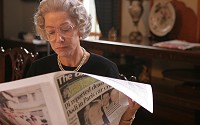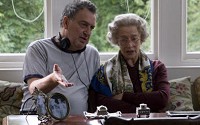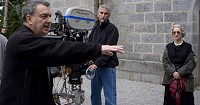 That imaginative leap
That imaginative leap
 Was it easier or more difficult to return to the role of Tony Blair?
Was it easier or more difficult to return to the role of Tony Blair?MS: Well, having done The Deal, which finished four years before The Queen begins, if you see what I mean. Itís very rare for an actor to get to play a character again, a few years later on. And that was partly what was great about doing it. Having gone through the fear, when we did The Deal, of whether Iíd be able to play Blair and whether an audience would accept me, and whether the piece itself would be acceptable, at least weíd got that out of the way. So the challenge was to take him further than Iíd taken him, or in a different direction. So yes, it was terrific.
Did you have to un-learn what you did with Blair the first time round?
MS: Fortunately there wasnít a huge amount of time in between filming The Deal and filming The Queen. Iíd done a lot of research already, it was just in there in my body and my memory anyway. And so it was mainly thinking about what had happened in between, and even though it was only five years, a lot had happened in between - heíd become leader of the Labour Party, gone through this huge General Election campaign which he was very insecure about. He didnít want to let what had happened to Kinnock happen to him. So even though everyone around him was saying, ďYouíre going to win by a landslideĒ, he wouldnít believe it, right up to the edge, wouldnít think about it. So heís got a very different energy to him in the period of The Queen. I thought the script reflected that as well, in that itís a much more subterranean journey for Blair. Heís not so much on the front foot all the time. Itís almost like the main things that are going on for Blair are happening off-screen, and he keeps being pulled back to this nagging thing thatís going on. Not that Iím referring to you, Helen, as the nagging thing, obviously. And eventually he has to turn his attention to that. So it was interesting to play that, rather than playing someone more like The Deal, the puppy dog.
Why, whenever you play Blair on screen, is he always going through a leadership crisis in real life?
MS: I think itís all down to me, that Iíve single-handedly brought Blair down. Itís weird. Once youíve played a character, whether a fictional character or a non-fictional character, you love them. You canít help but love them. You have to try and understand them; itís your own interpretation obviously, but thereís a connection you make that never goes away. So when I watch Blair on television now, itís like seeing a member of my family or something. It takes me a while to separate Blair as Prime Minister and the decisions he makes, and whether I agree, with Blair the character that I play. Itís difficult; thatís why I try not to talk about Blair the politician.
Youíve played several real-life people, including your great aunt in Radio 4 play. Whatís the challenge of playing real people?
HM: Iíd only discovered my great aunt very recently through getting the letters written to my grandfather translated, so she was a revelation to me. Iíd known nothing about her at all as a personality. It was a very recent discovery. That was incredibly moving for me personally to find this part of my family history. I havenít actually often played living people. Iíve avoided it because I think youíre in a no-win situation. Youíll never be half as good as the real person; all you can do really is fail. So Iíve always sort of avoided it. In fact this is the first time Iíve ever played a living person - Iíve played people who were alive but are now dead. Oh, I lie. I guess Calendar Girls, but that was a different thing. You canít imagine how intimidating and scary it is to contemplate playing someone like that. Itís terrifying. Especially knowing that down the pipeline Iím going to be sitting here talking about it, and thatís the most scary thing of all, because itís a bloody hot potato. You know youíre going to be under scrutiny, that people will ask you what do you think about the monarchy, and about Diana. Itís terrifying.
MS: Thereís a certain fear threshold you have to go through, apart from all the research you do and all the watching, on a basic level you have to say, ďI have the balls to do this, the courage, the chutzpah to stand up here and go, ĎI am the Queen, or whoever, and youíre going to believe it.íĒ And you have to get there.
SF: You canít escape the responsibility if somebody is alive. And also, the great French director Jean Renoir said, ďEveryone has their reasons.Ē All actors come and they make a case for their characters. They donít play the character to show how ridiculous they are - they actually make a case for the character. Anything else would be intolerable.
Is there one specific clue that you fix on?
HM: I did, yes - it was a little tiny 20 seconds of film of the Queen at about 12 years old getting out of a car and putting her hand out to shake hands with someone. It doesnít even go as far as the shaking of the hand. But the way she gets out of the car, and the way she puts her hand out, to me absolutely encapsulated the real character of the real person, when you extricate her from the institution and this thing that settled on her shoulders at the age of 25. Everything about her upbringing and her own internal personality. I watched that bit of film over and over again, and when I played her I was always playing that little 12-year-old girl.
SF: And for Michael thereís this little bit of film when Blair was 12.
MS: I think what Helen is describing is that at some point you make an imaginative connection with the character, and that can come from any direction, anywhere. Itís your imagination. You at some point have to go from the person youíre playing existing there on a TV screen, or there in a book, to that character suddenly being you, and youíre inside them. And you only do that by making this imaginative connection. And anything can do it. You can watch a bit of film, you can read something, you can hear something. And from that moment on, for me anyway, you depart from playing the real person. Youíre not playing the real person anymore, youíre playing this strange hybrid person thatís a creation of Stephen, Peter and Helen, or me. And thatís where it starts - for every actor theyíre actually playing themselves in different circumstances, coming from a different place or with different family background. You have to find where you are in Blair or in the Queen, I think.
While you were making it, did you think about how the public or the people portrayed would react to the film?
SF: When you open a film you donít dare think about things like that. Iím slightly overwhelmed by what has already happened, and itís happened very, very fast. Itís thrilling, and itís such a relief. Iíll tell you the most extraordinary thing thatís happened, which was in an article in The Spectator by Dianaís secretary who described going to the film to sneer at it and then that he couldnít imagine how it could have been better done. And it was so startling to read it. I mean, itís in the current issue - go buy several copies now. Itís just unbelievable, just astonishing - completely unsolicited and unexpected, but a quite extraordinary compliment.
A plug for the new Prime Suspect?
HM: Yes, Prime Suspect coming out in October. Itís very good too - very urban, very raw.
SF: Is the part played by you or the Queen?
HM: Iíd love to see her play Jane Tennison.
THE SAVOY, LONDON ē 12.Sep.06



STEPHEN FREARS
born 20.Jun.41 in Leicester
FILMOGRAPHY AS DIRECTOR


Dirty Pretty Things (2002)
Liam (2000)
High Fidelity (2000)
The Hi-Lo Country (1998)
The Van (1996)
Mary Reilly (1996)
The Snapper (1993)
Hero (1992)
The Grifters (1990)
Dangerous Liaisons (1988)
Sammy and Rosie Get Laid (1987)
Prick Up Your Ears (1987)
My Beautiful Laundrette (1985)
The Hit (1984)
Bloody Kids (1979)
Gumshoe (1971)
The Burning (1968)

PETER MORGAN
born 20.Jun.41 in Leicester
FILMOGRAPHY AS WRITER


Martha, Meet Frank, Daniel and Laurence (1998)
The Silent Touch (1992)
Dear Rosie (1990)